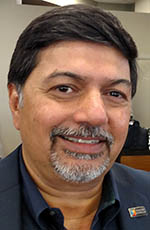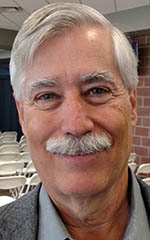By Rick Vacek
GCU News Bureau
Grand Canyon University is doing more than teach Colangelo College of Business students to find their purpose. It’s looking to have the same effect on the business world in general.
That was the focus Monday morning as Raj Sisodia, one of the authors of “Conscious Capitalism: Liberating the Heroic Spirit of Business,” spoke to a packed audience in the Student Union. And it will be the focus again Tuesday when, for the first time, deans of the business schools at Arizona’s four major universities are joined by Sisodia as they discuss how they can implement Conscious Capitalism into what they teach.
Dr. Randy Gibb, the CCOB dean, embraced Conscious Capitalism — which preaches a marketing strategy in which businesses implement practices that benefit both human beings and the environment — soon after he arrived at GCU last year. Gibb made it an important part of the curriculum because of the way it fits the University’s ideals.
But getting Sisodia, one of the leaders of the global movement, to come to campus for the CCOB Dean's Speaker Series was much more than an important step. It was a leap to the next level. His talk was as smooth as you might expect for such a nationally recognized figure, filled with statistics and graphics and history. But it also was filled with hope.
Sisodia said Millennials (ages 11 to 33 as of this year) will make up 75 percent of the workforce by 2030 and are “the most meaningful and purposeful generation we’ve ever had.” They are (1) more mindful and aware, (2) understand the consequences of their actions, (3) have a greater commitment to truth, (4) have a finer sense of right and wrong, (5) reject violence, (6) are more inclusive and (7) live in harmony with nature, he said.
That fits with the four pillars of Conscious Capitalism: (1) higher purpose, (2) stakeholder integration, (3) conscious culture and (4) conscious leadership.
Of course, all this is just talk unless the business world changes the negative perception most people have of it by thinking more consciously. And that, like most things in life, comes down to money.
“I think the one thing we have to awaken in the understanding in people is that money doesn’t buy happiness,” Sisodia said after his one-hour talk. “People might have multimillions, but it doesn’t mean that they’re content. They think they’ll be happier if they have another hundred million. Nothing is ever enough, if that’s what you care about.
“We need to put money in its proper context — it’s a means to an end. If you cannot respect the way you earn it, money has no meaning, and if you cannot use it to make people’s lives better, money has no purpose.”
Sisodia came to GCU because of his relationship with Scott McIntosh, founder and board chair of Conscious Capitalism Arizona and a member of the CCOB advisory board. McIntosh said he was an “unconscious conscious capitalist” before he discovered the Conscious Capitalism website and thought, “Somebody has articulated what I did for the last 30 years. I don’t have to invent that wheel.”
He was troubled by what he perceived after he sold another business in 2010.
“I thought I was hero, and I found out we’re the bad guys,” he said. “We’ve got to shift that message. There are some bad guys out there, but the analogy is that there are some bad marriages, some abusive marriages, and we don’t throw out the institution of marriage.”
So McIntosh has made it his mission to increase entrepreneurship among young people while at the same time turning them on to Conscious Capitalism. He joined the organization’s national board of directors and got to know Sisodia personally, and when Sisodia came up to him at a conference and asked, “How can I help?”, his answer was, “Well, you can start by coming here to Grand Canyon and talking about it.”
One of the things Sisodia talked about Monday was another perception: how workers look at their jobs. He said that, according to surveys, the number of U.S. workers who say they are “actively engaged” in their work is only 30 percent. Fifty percent say they are “not engaged” and 20 percent checked the “disengaged” box.
“Most businesses run on fear and stress,” he said. “That’s why there is ‘thank God it’s Friday.’”
But he insists it doesn’t have to be that way: “Love and work are the cornerstones of human existence. Why can’t we combine the two?”
Some businesses, such as Whole Foods and Southwest Airlines, have become famous for their transparent, forward-thinking approach. “You can feel the difference compared to a traditional business,” he said.
To underscore his point, Sisodia shared a cartoon in which two men on one side of a boat are bailing water while the two at the other end act as if it’s not their problem.
“There is no such thing on this planet as a side effect,” he said. “We are all in the same boat. Humanity is one spirit.”
Conscious Capitalism rocks the boat a bit, but in the view of Sisodia, Gibb and other entrepreneurs, it’s time to make money talk a new language.
Contact Rick Vacek at (602) 639-8203 or [email protected].











































































